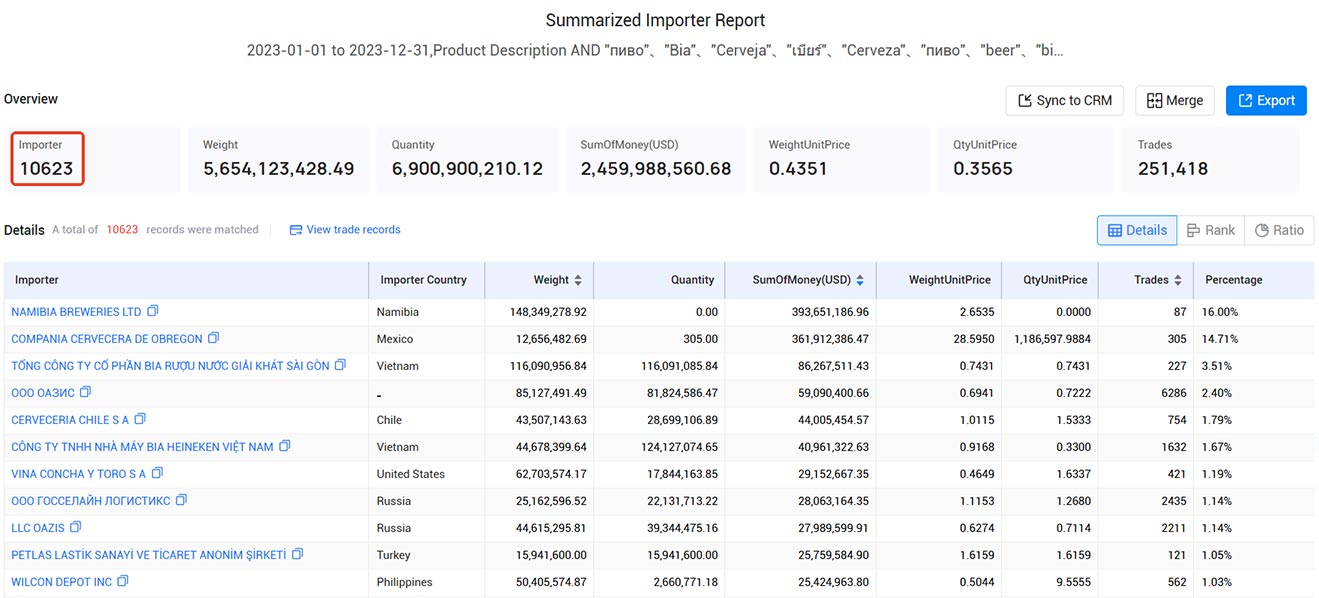 Import News
Import News
 26-11-2024
26-11-2024
When it comes to imported beer, it refers to beer that is produced in one country but imported and sold in another. The global beer market is highly diverse, with many countries both exporting and importing beer. Some nations are major exporters of beer, while others rely heavily on imports to satisfy local demand. Here's an overview of trends and facts related to the import of beer:

Key Trends in Beer Imports
1. Beer Consumption:
· Some countries, such as the United States, the UK, Germany, and Japan, are known for their high beer consumption and therefore have large import markets for beer.
· The demand for imported beer often correlates with consumer preferences for diverse beer styles, craft beers, and premium brands.
2. Premium and Craft Beer Growth:
· Premium and craft beers have seen substantial growth worldwide. In many markets, beer consumers are increasingly seeking imported premium brands or local craft brews, which often leads to higher imports from renowned brewing countries.
· Countries like Belgium, Germany, and the Netherlands are well known for exporting a variety of beer styles, and their products have found markets in places like the U.S., the UK, and Canada.
3. Regional Preferences:
· In the U.S., imports from countries like Mexico (Corona, Modelo), Germany (Heineken, Beck's), and Belgium (Leffe, Chimay) are popular.
· In the UK, imports from countries such as Belgium, the Netherlands, and Germany are highly regarded, particularly in the premium and craft beer sectors.
· Asian countries like China and Japan are large importers of beer, with popular global brands like Budweiser, Heineken, and Carlsberg being widely consumed.
4. Import Volume and Growth:
· The growth of beer imports often depends on factors like the local market's economic conditions, the beer-drinking culture, and the quality of local beer production.
· In the U.S., the beer import market is growing, with Mexican beers being a significant part of this trend.
· Countries like China and India have also experienced an increasing demand for imported beer, with Western brands gaining popularity in urban areas.
Global Top 10 Beer Importers in 2023
According to data provided by Tendata, the largest importer of imported beer in the world is:
1.NAMIBIA BREWERIES LTD(16%, $393.65 Million)
2.COMPANIA CERVECERA DE OBREGON(14.71%, $361.91 Million)
3.TỔNG CÔNG TY CỔ PHẦN BIA RƯỢU NƯỚC GIẢI KHÁT SÀI GÒN(3.51%, $86.27 Million)
4.ООО ОАЗИС(2.4%, $59.09 Million)
5.CERVECERIA CHILE S A(1.79%, $44.01 Million)
6.CÔNG TY TNHH NHÀ MÁY BIA HEINEKEN VIỆT NAM(1.67%, $40.96 Million)
7.VINA CONCHA Y TORO S A(1.19%, $29.15 Million)
8.ООО ГОССЕЛАЙН ЛОГИСТИКС(1.14%, $28.06 Million)
9.LLC OAZIS(1.14%, $27.99 Million)
10.PETLAS LASTİK SANAYİ VE TİCARET ANONİM ŞİRKETİ(1.05%, $25.76 Million)
>>Get More Beer Importers through Tendata<<

Popular Countries for Beer Imports
1. United States:
· The U.S. is one of the largest beer importers in the world. The demand for imported beer in the U.S. has been growing, with consumers seeking diverse beer styles, including craft beers, IPAs, and international lagers.
· Popular imported beer brands in the U.S. include Heineken, Corona, Stella Artois, and Modelo.
2. United Kingdom:
· The UK has a strong tradition of beer drinking, and imported beer plays a significant role in the market. European beers, especially from Belgium, Germany, and the Netherlands, are highly valued.
· Popular imported beer brands in the UK include Budweiser, Heineken, and Pilsner Urquell.
3. China:
· Although China has a large domestic beer market, it is also a significant importer of beer. Imported beer is considered premium, and global brands such as Budweiser, Heineken, and Carlsberg are in high demand.
· Import volumes in China have increased as consumers have more disposable income and are shifting toward international brands.
4. Australia:
· Australia imports a significant amount of beer, particularly from countries such as Belgium, the U.S., and the UK. The demand for craft beer and premium beer is on the rise.
· Popular imported beers in Australia include Heineken, Corona, and Stella Artois.
Conclusion
The global beer import market is dynamic and growing, driven by changing consumer preferences, the growth of premium and craft beer, and the influence of globalization. Countries like the U.S., the UK, China, and Australia are key importers of beer, with European and Latin American brands leading the way. However, the market also faces challenges such as tariffs, taxes, and regulatory hurdles, which can impact the price and availability of imported beers. For businesses seeking to tap into the imported beer market, understanding these trends and navigating the complexities of international trade is essential.
Category
Leave Message for Demo Request or Questions


 T-info
T-info T-discovery
T-discovery

 My
Tendata
My
Tendata Market Analysis
Market Analysis Customer
Development
Customer
Development Competitor
Monitoring
Competitor
Monitoring Customer Relationship
Customer Relationship





































































































































